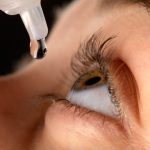Dry Eye Treatment Before Cataract Surgery
Written by Dr. David Evans Last modified on March 7, 2019
The Caribbean Eye meeting is always a great conference to learn about new eye care breakthroughs from some of the top experts in the eye surgery field. This year was no exception. a number of panels were convened to discuss nuances and new developments in vision correction surgery. The focus is always on how to make surgery better for the patients, and how to get the best visual outcomes.
One topic that kept popping up with great importance throughout the meeting is dry eye. We have written a number of articles and posts about various dry eye topics, several of which deal with the treatment of dry eye after eye vision surgery (particularly after LASIK surgery). But this is the first meeting where I learned about the importance of dry eye treatment before both LASIK and cataract surgery.

With dry eye, an uneven tear film is like ice that has been skated on and chewed up.
Why Am I Being Treated for Dry Eye Before Surgery?
Several of the panelists discussed the importance of treating cataract patients before surgery. This was a new approach to me, and needless to say it piqued my interest. Furthermore, the topic is becoming more important from a patient education standpoint, as some patients are a bit confused. They wonder why they visited the doctor for an appointment for a cataract evaluation, but ended up being treated for dry eye. Once the importance of this process is explained to the patients, it all becomes very clear (no pun intended).
Dry Eye Can Reduce Quality of Vision
The primary reason why doctors are focusing more on the treatment of dry eye before LASIK and cataract surgery is tied directly to the tear film, the oily, watery layer of mucous the spreads over the surface of the eye. One important aspect of tear film is that it coats the front of the cornea and provides a very effective layer on the front of the eye to help properly focus images. When patients have dry eye, often this tear layer breaks down, causing blurred or distorted vision, and potential eye discomfort. Perhaps you have experienced this during allergy season, noticing that sometimes your vision is not as clear as it is at other times. This is due to tear film break-up that leaves the front focusing surface of the eye uneven.
But Why Before Cataract Surgery?
The outcomes from cataract surgery are so good now, that doctors are making strides in ensuring even small nuances in the patient’s vision are properly corrected during surgery. The refractive prescription is used to determine the best IOL (intraocular lens) for vision correction during surgery for each individual patient.

Treating dry eye is like running a zamboni over the ice to even it out, making it smooth and uniform.
When there is dry eye present, the tear film is uneven and the images can be a little blurred or distorted. In these cases, it can be more difficult for the patient (and the doctor) to determine which prescription provides the best vision. To optimize the selection of the best IOL, it is best to treat the patient before the final pre-surgery examination to ensure that the tear film is as smooth an optical surface as possible. Once a smooth tear surface has been created, the surgeon can get focused on determining the most accurate prescription, choosing the best lens and scheduling surgery.
The length of time necessary for dry eye treatment depends on the patient and level of dry eye. But, it is best to plan on at least a few months of treatment before a smooth surface can be maintained on front of the eye and cataract treatment can proceed.
Dry Eye Treatment Before LASIK
Treating patients for dry eye before LASIK is done for the same reason as it is with cataract surgery. LASIK surgeons want to create the best optical surface on the front of the eye to help the better predict the amount of correction needed during the laser procedure.
The bottom line is that by treating the common issue of dry eye before surgeries for LASIK and cataracts, your doctor is able to ensure a smooth, uniform tear film and optimal refractive outcome from treatment.
Other Benefits
The other benefit of treating dry eye before surgery is to determine whether and how well the patient responds to dry eye treatment. In some patients, eye surgery can induce dry eye as part of the surgical side effects. If the patient responds well to dry eye treatment before surgery, then it typically is a good indication of a good response after surgery, if treatment is needed.
Of course, in the case of LASIK patients, if dry eye is advanced or severe before surgery, then the patient may not be a good candidate for LASIK. The level of dry eye can be a disqualifying test for LASIK. Other options can include PRK or an implantable contact lens.
The bottom line is that when being evaluated for either cataract or LASIK surgery, expect to be tested for dry eye. And, don’t be surprised if the surgeon sends you away with dry eye treatment and wants to re-evaluate before scheduling surgery. Treating dry eye before can have great long-term benefits, as you can enjoy the benefits of the technological advancements in vision surgery that now allow correction of the minute imperfections in your vision.




